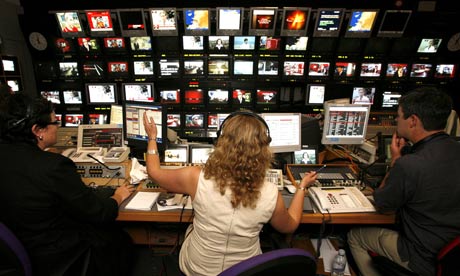Too much information? BBC News 24 producers at work. Photograph: Rex Features/HXA
The renewed interest in Tolstoy, resulting from the film about his final days, The Last Station, reminded me that more than a year ago I'd pledged to read War and Peace. As someone who'd tackled the fat charms of Dickens and Thackeray at university, I realised that it had been a long time since I'd read a novel of huge length or, indeed, anything published pre-20th-century. Finishing War and Peace would reassure me that my stamina was intact. I just took the novel from the shelf to discover from my bookmark that I'd reached page 55. I don't even have the excuse of children.
This in itself wouldn't have alarmed me – it is, after all, War and Peace – were it not for the preponderance of other bookmarks that I discovered, erupting from the midst of novels everywhere, like distress flares. Was I finishing any of them? How could it be that someone who loved fiction enough to study it at Masters level, teach it, and then go on to write it for a living had become so distracted from the garden of literature?
The world of my student days, however, was fundamentally different from this one. It was only towards the end of my degree that a friend showed me a marvel named the internet (Him: "Type in anything, it'll find you a website!" Me: "What's a website?") In the 90s, there were a mere four TV channels. Each household had a single phone-line, usable once at a time. Only geeks played "video games". It was much easier to remove oneself completely from the world into the vast architecture of the novel. Now, the reader is under assault from hundreds of television channels, 3D cinema, a computer-gaming business so large it dwarfs Hollywood, iPhones, Wii, YouTube, free commuter newspapers, an engorged celebrity culture, instant access to all the music ever recorded, 24-hour sports news, and DVD box-sets of shows such as The Wire, Mad Men and Lost that replicate some of the scope and depth of literature. Unprecedented levels of consumer debt, and now a recession, have seen everyone working longer hours. A leisure time that was already precious has been chewed into by text-messaging, Facebook and emails. Almost everyone I speak to claims that they "love books but just can't find the time to read". Well, they probably could – they're just choosing to spend it differently.
This has dire consequences for our collective intellect. So besieged are we by the entertainment industry that we are being stimulated only in certain directions. The sound of fizz is everywhere. Sustained concentration on the printed word, whether in-depth argument or fictional narrative, creates a particular cerebral event which visual-dependent media cannot. The assault upon this has meant the very theft of our thinking space.
Obviously media such as the internet offer enormous benefits to (you wouldn't be reading this otherwise), but they also glide easily into the surface world of sleek illusions and infinite chatter which surrounds us. And have you seen Avatar? Have you seen what they can do now? Call me melodramatic, but I am beginning to feel like the protagonist in some SF dystopia myself, having his own thoughts erased, and liking it.
Culture changed quickly and permanently in the last decade. That pregnant, mental pause of reading has come under threat like never before. "Writing is a form of personal freedom," said Don DeLillo in a letter to Jonathan Franzen, who had appealed to him about this very issue long before the arrival of the internet. "It frees us from the mass identity we see in the making all around us. In the end, writers will write not to be outlaw heroes of some underculture, but mainly to save themselves, to survive as individuals." Exactly the same statement, I think, describes the condition of serious readers.
Pass me that copy of Tolstoy. This is war.
>http://www.guardian.co.uk/books/booksblog/2010/feb/02/who-stole-reading-time?...
